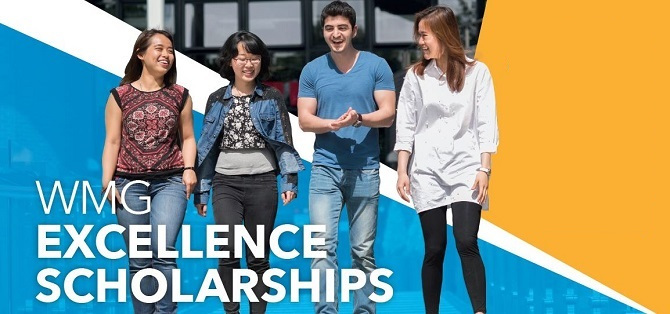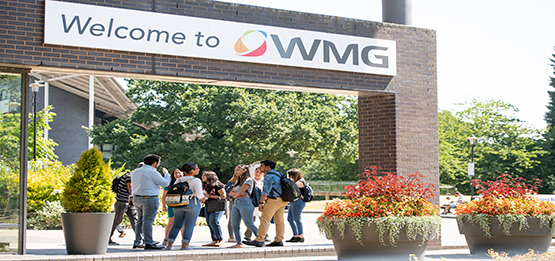Sustainable Automotive Electrification (MSc) (2023 Entry)

Explore our Sustainable Automotive Electrification taught Master's degree.
Sustainable Automotive Electrification MSc is designed for engineering or other STEM graduates with an interest in automotive innovation. The course is ideally suited to those aspiring to become research managers and technology leaders within the strategically important areas of vehicle electrification and sustainability.
Course overview
Through this course, you will develop the skills to design and evaluate the next generation of automotive products that have a lower environmental impact than conventional vehicles.
Within the context of environmental legislation and consumer expectations for vehicle quality, reliability, and performance, you will learn to assess the different technology options and methods for design, system integration, and verification that will drive the market introduction of new energy efficient vehicles. Working within WMG’s state-of-the-art facilities, you will gain from the latest innovations in research and technology management that are prerequisite for career progression within the international automotive industry.
This course is designed to be accredited by the Institution of Engineering and Technology (IET) on behalf of the Engineering Council as meeting the requirements for Further Learning for registration as a Chartered Engineer. Candidates must hold a CEng accredited BEng/BSc (Hons) undergraduate first degree to comply with full CEng registration requirements.
General entry requirements
Minimum requirements
2:i undergraduate degree (or equivalent) in Engineering, Mathematics, Physics, or Computer Science.
Candidates with a UK 2:ii (or equivalent) may be accepted upon demonstration of relevant professional experience
English language requirements
You can find out more about our English language requirementsLink opens in a new window. This course requires the following:
- Band A
- IELTS overall score of 6.5, minimum component scores not below 6.0
International qualifications
We welcome applications from students with other internationally recognised qualifications.
For more information, please visit the international entry requirements pageLink opens in a new window.
Additional requirements
Candidates with professional experience should include their CV with their application.
Core modules
Core modules are required modules that all students will complete whilst on this programme. For SAE, your core modules are:
- Automotive Research, Strategy and Environment
- Automotive Hybridisation and Electrification
- Energy Storage Systems
- Electric Drivetrains
- Systems Engineering and Functional Safety
- Modelling and Simulation of Systems
Optional modules
Two elective modules should be selected from the following list. These modules will allow you to gain further specialist, technical understanding.
- Battery Electrochemistry, Design and Manufacture
- Power Electronics and Converters Design and Manufacture
- Electric Machine Design and Manufacture
- Smart, Connected and Autonomous Vehicle Fundamentals
Read the module descriptions for this course on WMG's website.Link opens in a new window
Teaching
This course has two components – a taught component accounting for two thirds of your time and effort, and a research component accounting for one-third.
For the taught component, we blend synchronous and asynchronous lectures with workshops, practical exercises, demonstrations, case studies, problem classes, syndicate exercises, and a review. aClass sizes are kept small with 20-25 students in each, to facilitate and encourage interaction.
Our module leaders have extensive industry experience. Guest speakers from industry also contribute regularly, bringing real-world insight into your learning experience.
In addition to your taught modules, you will undertake a major project as part of your Masters’ degree, which will develop your research and analytical skills and enable you to specialise. This is nominally 600 hours (60 CATS points) of learning, mainly taking place during the Spring and Summer terms. You will be expected to engage regularly with your Project Supervisor and to provide progress updates and drafts of your work to an agreed schedule.
Class sizes
Overall this course can accommodate up to 48 students, divided into two groups of 24 students for most modules.
Typical contact hours
Module delivery patterns vary, but most will be delivered in a short learning block of up to 4 weeks, allowing your focus to be on one module at a time. Each module nominally accounts for 150 hours, which includes scheduled classroom time and online sessions as well as your independent study and assessments.
WMG runs a SPA module (Study, Professional and Analytical Skills) designed to meet the complex learning and professional needs of postgraduate students. This is a blended module delivered throughout the year alongside your modules. Whilst it is an unaccredited module for SAE students, your participation in the lectures, workshops and online sessions is strongly encouraged. There may be occasions where you will be required to attend evening or weekend sessions.
Assessment
Modules are predominantly assessed by way of written Post Module Assignments (PMA), but assessment can also be in other formats. Most modules will also have a degree of In-Module Assessment (IMA), which will vary by module and may take the form of presentations, on-line tests, self-reflection or a range of other methods.
For the research component, you will undertake a major project. Leveraging the close partnerships that WMG has with key organisations within the automotive supply chain, it is envisaged that your project will have an industrial sponsor and be closely aligned with overcoming a real-world problem in the areas of vehicle electrification and sustainability. Many of the projects will feed directly into larger research programmes and will require you to liaise directly with senior academics, researchers, and industry partners.
Project submission is likely to include both a written and a presentation element, accounting for 33% of your overall academic grade.
Reading lists
Most departments have reading lists available through Warwick Library. If you would like to view reading lists for the current cohort of students you can visit our Warwick Library web pageLink opens in a new window.
Your timetable
Core modules will be allocated to students at the end of the first week of term - you will then be able to view your individual module schedule for the rest of the year via the WMG module selection system.
Elective modules will be bookable through the same system later in the term.
Modules will include scheduled classroom time and online sessions as well as your independent study and assessments, and will usually be delivered within a 4 week timeframe. Occasional classes and study skills sessions may be held at weekends or in the evenings.
As a Masters student, you are expected to manage your own time appropriately. On average, you are expected to commit 38-40 hours of study each week, in order to successfully achieve your Master’s degree.
This is a full-time postgraduate course - undergraduate term dates do not apply. Whilst there are no holidays as such, there will be no teaching scheduled when the University is officially closed, during the two weeks over Christmas and New Year.
Your career
Graduates from the MSc in Sustainable Automotive Electrification can expect to take a leadership role with a vehicle manufacturer or specialist supplier. We would expect you to become a research manager or technology leader within the strategically important areas of vehicle electrification and sustainability.
You will have gained the management skills, technical awareness, and vision to assess different technology options within the context of environmental legislation and consumer expectations for vehicle quality, reliability, and performance.
Helping you find the right career
Our department has a dedicated professionally qualified Senior Careers Consultant offering impartial advice and guidance together with workshops and events throughout the year. Previous examples of workshops and events include:
- Warwick careers fairs throughout the year
- WMG Future Fest
- Options in Engineering sector event
- Careers for experienced hires
- Careers in Cyber Security
- Careers in healthcare
- Careers in project management
WMG at Warwick
Having forged strong links with global companies through 42 years of collaborative research and development, we really understand the global market you’ll be operating in, and have designed our programmes to match.
Find out more about us on our websiteLink opens in a new window
Our courses
- Cyber Security Engineering (MSc)
- Cyber Security Management (MSc)
- e-Business Management (MSc)
- Engineering Business Leadership (MSc)
- Engineering Business Management (MSc)
- Games Engineering (MSc)
- Healthcare Operational Management (MSc)
- Innovation and Entrepreneurship (MSc)
- Intelligent Manufacturing Systems (MSc)
- International Trade, Strategy and Operations (MSc)
- Programme and Project Management (MSc)
- Smart, Connected and Autonomous Vehicles (MSc)
- Supply Chain and Logistics Management (MSc)
- Supply Chain Leadership (MSc)
- Sustainable Automotive Electrification (MSc)
Our Postgraduate Research degrees
Visiting WMG
There are a number of different ways to visit the University of Warwick throughout the year. We host bespoke PG visits, where you can talk directly with your chosen department and explore our campus through a personalised tour. WMG also organises events for prospective students including a weekly Live Chat so you can connect directly with the department to speak with staff and students from WMG. For more about university wide open days and tours, visit our Postgraduate Visits page.
Scholarships and bursaries

Scholarships and financial support
Find out about the different funding routes available, including; postgraduate loans, scholarships, fee awards and academic department bursaries.

WMG funding opportunities
WMG will be awarding over £1million in scholarships and bursaries to students commencing study on our full-time MSc programmes

Living costs
Find out more about the cost of living as a postgraduate student at University of Warwick.
Additional funding information
We have a number of research projects available which are fully or partially funded. The majority of these are for UK/EU applicants, though occasionally we advertise positions that are also open to overseas applicants. Please refer to specific project descriptions for details. See our Research Degree opportunities here.

Find out how to apply to us, ask your questions, and find out more.

Taught course applications
Here is our checklist on how to apply for taught postgraduate courses at Warwick.

Application advice from WMG
Please see the WMG department web pages for specific application advice and information.

After you’ve applied
Find out how we process your application.

Applicant Portal
Track your application and update your details.

Admissions statement
See Warwick’s postgraduate admissions policy.

Join a live chat
Ask questions and engage with Warwick.
Postgraduate Open Day
Our Postgraduate Virtual Open Day will help you find out more about your course of interest, as well as general topics like applying to Warwick, accommodation, careers and funding.Postgraduate fairs
Throughout the year we attend exhibitions and fairs online and in the UK. These events give you the chance to learn about our Master's and PhD study routes, and the wider context of postgraduate study.
Live chats
Every week, you can connect directly with representatives from Warwick, who will be answering your questions on applying to and studying postgraduate studies at Warwick.
Departmental events
Some academic departments hold events for specific postgraduate programmes, these are fantastic opportunities to learn more about Warwick and your chosen department and course.
Connect with us
Want to hear more about postgraduate study at Warwick? Register your interest and find out more.
